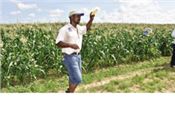|
Field Day Stresses Need For Young People In Agriculture

Southern University assistant county agent Odis Hill, a fourth-generation farmer who hosted the Morehouse Parish Field Day on July 19,
shows off sweet corn that he grows as a side crop in addition to field corn and soybeans.
Photo by Johnny Morgan/LSU AgCenter
BONITA, LA.
The importance of connecting young people to agriculture and securing the future of farming in America emerged as central themes at the 2019 Morehouse Farm Field Day held in Bonita.
“Do it because you love it,” said Southern University assistant county agent Odis Hill, a fourth-generation farmer who hosted the event for the second consecutive year on his family’s farm.
Hill said more farmers are needed and urged young people to consider pursuing degrees in agriculture.
“Young people have the greatest opportunity they have ever had in agriculture,” said Rogers Leonard, LSU AgCenter associate vice president.
As the need for food and fiber is expected to increase significantly by the year 2050, young people will need to play a critical role in meeting the challenges ahead, Leonard said.
“I can promise you we can’t meet these challenges if we don’t have farmers,” he said, adding that in Southern University AgCenter and the LSU AgCenter, Louisiana has two of the best institutions in the Southern region to support agriculture research, education and outreach.
California author Natalie Baszile said she was encouraged during her visit to the field day by the young people she met who are continuing the farming tradition.
Baszile’s novel “Queen Sugar,” set in contemporary rural Louisiana, is the inspiration for the television drama series by the same name. The book tells the story of a young African American widow who moved from California to assume management of a sugarcane farm left to her by her late father.
“You are continuing a farming tradition that is really part of the American story – a story that I feel has not really been told, and a story that I’m committed to continue to tell,” she said.
The field day drew more than 200 adults and youth and was sponsored by the Southern University AgCenter, LSU AgCenter, the Morehouse Black Farmers and Landowners Association with support from numerous businesses and industry groups. The field day was part of the National Black Growers Council 2019 Model Farm Series tour.
“We need all the tools in our toolbox that we can get,” said P.J. Haynie, chairman of the National Black Growers Council.
Keeping farmers informed about programs, technology, chemistry and equipment in a timely manner is key to fulfilling the council’s mission to improve the efficiency, productivity and sustainability of black row crop farmers, Haynie said.
“We’ve been hosting these field days in Morehouse Parish for 18 years and want to show the young people that we are still able to grow and harvest a crop and survive,” said Harper Armstrong, president of the Morehouse Black Farmers and Landowners Association.
The field day showcased new technologies and provided updates from experts on soybean, corn and hemp production.
“We hope for you to be able to grow hemp next year,” said Mike Strain, commissioner of the Louisiana Department of Agriculture and Forestry.
In Louisiana, one crop of hemp is estimated to take about 110 days from seed to harvest, offering growers a chance to potentially harvest two crops a year, he said.
“We are going to walk through this carefully,” Strain said, adding that federal guidelines for hemp production should be released soon. Louisiana will be able to finalize its plan soon after.
Ensuring that growers have a viable crop, the information needed to bring that crop to harvest and the capacity to have it processed will continue to be a priority moving forward, he said.
Art Walker, president of the Louisiana Industrial Hemp Alliance, said more than 50,000 industrial products can be made from hemp, including paper, clothes, plastics, biofuels, soap, cosmetics, car wash and building materials.
“Farmers like these will do very well with hemp for the industrial side of the industry,” he said. “It’s a bit different with hemp for CBD production.”
Regulations for production of hemp-derived cannabidiol, or CBD, oil are significantly more complex than those for industrial hemp, Walker said.
Strain reminded farmers to apply for sales tax exemption certificates by completing Form R-1085 with the state Department of Revenue.
“We have to maintain our sales tax exemption because without that, we are not competitive,” Strain said.
Topics featured on the farm tour included:
• Corn test plot results by LSU AgCenter associate professor Dan Fromme.
• Soybean herbicide technologies by FMC Agricultural Solutions retail market manager John Lee.
• Nematodes in soybeans by LSU AgCenter agent Richard Letlow.
• Soybean varieties by Corteva Agrisciences territory manager Caleb Wilson.
• Bayer soybean test plot results by Bayer outreach lead Dewayne Goldmon.
• Corn herbicides by FMC retail market manager Don Johnson Sr. ∆

Louisiana Industrial Hemp Alliance president Art Walker speaking at the Morehouse Parish Field Day
on July 19 said more than 50,000 industrial products can be made from hemp,
including paper, clothes, plastics, biofuels, soap, cosmetics, car wash and building materials.
Photo by Johnny Morgan/LSU AgCenter
|
|